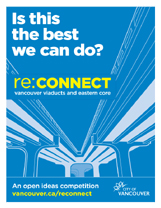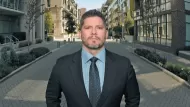As my last post profiled, Vancouver is creatively working to define the future of our Georgia and Dunsmuir Viaducts - infrastructure that I've referred to as "the asterix" beside the statement that Vancouver has no freeways within our city. One of several inputs into that process is an open ideas competition called re:CONNECT.
As my last post profiled, Vancouver is creatively working to define the future of our Georgia and Dunsmuir Viaducts - infrastructure that I've referred to as "the asterix" beside the statement that Vancouver has no freeways within our city. One of several inputs into that process is an open ideas competition called re:CONNECT.

The deadline for submissions has come and gone, and we've been thrilled with the response, with 104 unique submissions from 13 countries (US, Mexico, UK, Ireland, France, Germany, Poland, Turkey, Slovenia, South Korea, Hong Kong, Australia and Canada). The international response is wonderful, but I'm particularly pleased with the number of local entries, showing the great energy and creativity around this key city-building question - 60% of the submissions were from Vancouver, and 75% from Metro Vancouver.
Our exceptional jury of urban experts (led by Great Streets author and urbanist Allan Jacobs), has done their hard work and selected winners and honourable mentions in the 3 categories (Connecting the Core, Visualizing the Viaducts, and Wildcard), in both the fee and free streams. Their picks will be revealed at a public forum on December 1.
On top of the jury's picks though, on-line voting will determine "peoples choice" winners in each category, which will be announced at the same December 1 forum.
And thus the reason for this post ... If you have an interest in the future of the Viaducts and our Eastern Core, I hope you'll study the entries on-line, and help us select our peoples choice winners! You can pick one favourite, or rank and comment on any/all of the submissions. The deadline for voting is midnight, Sunday November 27th.
Although we're excited to see the winners revealed, the real value of the competition is in the totality and diversity of the ideas. Submissions range from the beautification of the viaducts, to their re-use as open space or other uses, or their partial or complete removal and replacement. The visions range from the practical and pragmatic, to the futuristic and whimsical. Submitters appeared to be inspired by everything from water and nature, to our urban past and current housing challenges, to volcanoes, horses, corn-dogs, and knitting yarn!
For readers interested in idea competitions of this type, re:CONNECT is re-confirming my long-held belief that they can be an exceptional way of stimulating creativity and dialogue, and generating out-of-the-box ideas, that no other form of engagement can replicate. Stay tuned - a future post will profile the winners, and my own thoughts on some of the most intriguing ideas.

Planetizen Federal Action Tracker
A weekly monitor of how Trump’s orders and actions are impacting planners and planning in America.

Map: Where Senate Republicans Want to Sell Your Public Lands
For public land advocates, the Senate Republicans’ proposal to sell millions of acres of public land in the West is “the biggest fight of their careers.”

Restaurant Patios Were a Pandemic Win — Why Were They so Hard to Keep?
Social distancing requirements and changes in travel patterns prompted cities to pilot new uses for street and sidewalk space. Then it got complicated.

Maui's Vacation Rental Debate Turns Ugly
Verbal attacks, misinformation campaigns and fistfights plague a high-stakes debate to convert thousands of vacation rentals into long-term housing.

San Francisco Suspends Traffic Calming Amidst Record Deaths
Citing “a challenging fiscal landscape,” the city will cease the program on the heels of 42 traffic deaths, including 24 pedestrians.

California Homeless Arrests, Citations Spike After Ruling
An investigation reveals that anti-homeless actions increased up to 500% after Grants Pass v. Johnson — even in cities claiming no policy change.
Urban Design for Planners 1: Software Tools
This six-course series explores essential urban design concepts using open source software and equips planners with the tools they need to participate fully in the urban design process.
Planning for Universal Design
Learn the tools for implementing Universal Design in planning regulations.
Heyer Gruel & Associates PA
JM Goldson LLC
Custer County Colorado
City of Camden Redevelopment Agency
City of Astoria
Transportation Research & Education Center (TREC) at Portland State University
Camden Redevelopment Agency
City of Claremont
Municipality of Princeton (NJ)



























